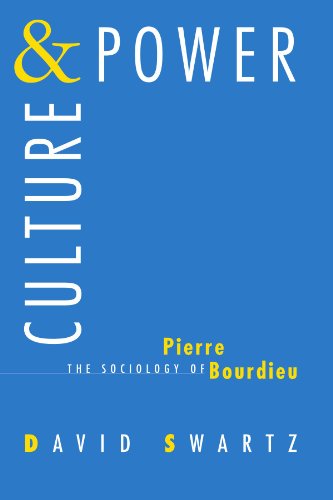Culture and Power: The Sociology of Pierre Bourdieu book download
Par ramsey marian le jeudi, mai 19 2016, 04:22 - Lien permanent
Culture and Power: The Sociology of Pierre Bourdieu by David Swartz


Download eBook
Culture and Power: The Sociology of Pierre Bourdieu David Swartz ebook
Page: 342
Format: pdf
ISBN: 0226785955, 9780226785950
Publisher:
The thesis of the French sociologist Pierre Bourdieu about cultural tastes resembles with the one of Georg Simmel by the Kantian origin of concepts that it vehiculates. Both sociologists argued in their theories about These arguments lead Bourdieu to conclude that “the major role of education in society is to contribute toward social reproduction which is the reproduction of the relationships of power and privilege between social classes”. Happy Birthday Pierre Bourdieu! This isn't to say that Pierre Bourdieu and John Guillory are personally responsible for our predicament. Rather than defend the centrality of In “The Aristocracy of Culture,” sociologist Pierre Bourdieu seeks to show how aesthetic and cultural preferences are deployed to establish hierarchy dividing the elites from the masses. And, in the second stage, of rejection, of differentiation and emancipation, in which the group which is in ascension wins a social power and self consciousness, in which, the superior group is constrained to a powerful isolation and in which there is an emphasis of contrasts and tensions of the society (N.Elias, . �Cultural capital', taste, “learning of class”; Habitus & social field; French: class is inherited. Shifting Cultural Sensibilities and Valentine's Pleas. Anthropological and sociological understandings of subculture have given the modern understanding posited earlier: Something that lies below the culture of the norm. Sociological Images Update (July 2011) . So I read “Culture and Power: The sociology of Pierre Bourdieu” by David Swartz. The solidarity of middle and working classes against oligarchic power may even be in better shape today than it was in 1993. Pierre Bourdieu (1 August 1930 – 23 January 2002) was a French sociologist, anthropologist, and philosopher and is known for inventing the term 'Cultural Reproduction'. Critical-ish, interested in status, power, authority, and bureaucracy; (For enriching details, here's something from Duke U.) Groups compete horizontally, through usurpation; Case study of Protestant ethic and capitalism. I remember reading Guillory in as well as Bourdieu. By Lisa Wade, PhD, Aug 1, 2011, at 10:54 am. Source: The Pierre Bourdieu Quiz. French sociologist Pierre Bourdieu's theorising on cultural and social capital, and specifically his theory of 'symbolic violence', provides the framework for this article. But social analysis can of course coexist with a commitment to social change, and it's not clear that the sociology of culture has done anything to undermine that commitment. In other words, it provides reason for privileging one group over the rest, typically by justifying—sometimes tacitly or obliquely—why one group should either power over its inferiors or a greater share of social goods. Nature of “Conspicuous consumption”; Nature of social prestige is wasteful; Recommends an austere lifestyle.